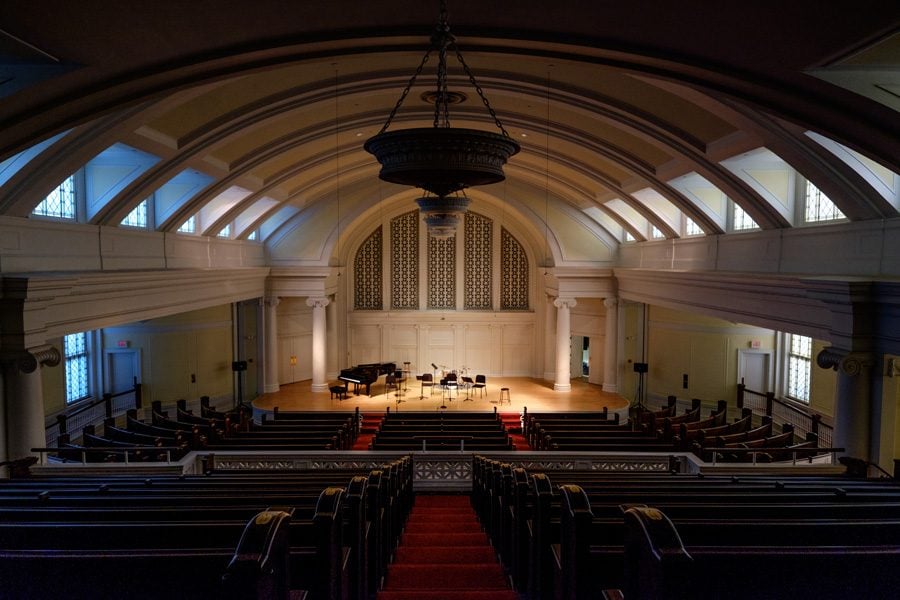Music Institute concert to honor Chicago jazz legend Louis Armstrong
Jeffrey Wang/Daily Senior Staffer
The Music Institute of Chicago will be paying tribute to jazz legend Louis Armstrong in a concert held Nov. 12 at the Nichols Concert Hall in downtown Evanston.
November 9, 2016
A&E
Evanston will get the chance to swing this weekend when the Music Institute of Chicago revives the classic tunes of Louis Armstrong during a concert in town.
The Music Institute will be holding its Louis Armstrong Legacy Concert on Nov. 12 at the Nichols Concert Hall in downtown Evanston. The concert will feature some of the classic works of the legendary jazz musician, who spent many of his formative years in Chicago.
Don Vappie, the musical director and guest artist for the concert, described Armstrong as a “genius” who helped rewrite the standards for jazz music.
“Whatever he was thinking, he could play, which is sort of the foundation for jazz musicians,” Vappie said. “We all strive for what he could do.”
Victor Garcia, a teacher at the Music Institute and the trumpeter for this performance, said it is an honor to channel Armstrong on the trumpet. He cited Armstrong as a personal inspiration and said he admired the musician’s talent as a showman who could connect with audiences.
Garcia said he was unsure why he was drawn to the music of Armstrong and other jazz musicians like Dizzy Gillespie as a child. But he later realized his appreciation for the inclusivity and celebration of the individual performer that jazz offered.
“I really loved that it was inviting to everyone regardless of what color you were; it didn’t matter what your cultural background was,” Garcia said. “It was music that could really be enjoyed by anyone and everyone.”
Mark George, the president and chief executive officer of the Music Institute, said jazz might not be the largest program at the Institute, but it is growing quickly. He described Armstrong’s famous “Hot Five” and “Hot Seven” recordings, which were produced in Chicago, to be a major turning point in jazz with the “perfect balance” between composed and improvised material.
George admitted jazz is not as prominent in pop culture as it once was, but he said the jazz scene remains vibrant, partially due to its unique ability to evolve.
“(Jazz) tends to gobble up every type of music that it hears,” George said. “It gets incorporated somehow into the jazz ethos and keeps the music alive.”
Though Armstrong spent many years in Chicago, he was a New Orleans native. Vappie shares these New Orleans roots: He said his ancestors have been involved in music there for generations, and more than just being interested in the music scene, he feels a part of it. The city’s rich history and unique culture influenced both his and Armstrong’s musical development, he said.
Though he is reluctant to separate jazz music into distinct categories, Vappie said, there are some distinguishing factors in New Orleans jazz, such as the way performers improvise in a back-and-forth manner.
In this concert, Vappie said he hopes to bring in some of his “New Orleans-ness” and honor Armstrong’s roots. He said he is trying to find a balance between respecting Armstrong’s music and allowing for individual interpretation.
“The goal is to go back and perform some of that music as a classic entity, as you would Bach or Beethoven,” Vappie said. “But at the same time I want to allow everyone to explore themselves to a degree.”
Vappie said jazz musicians are motivated by a desire to discover, not to make money. He said his dream job would be to simply stay home, practice and expand his musical knowledge.
George added that a healthy knowledge of music is beneficial for anyone, even if they are not interested in becoming professional musicians. Learning music has proven benefits for the brain, he said, in addition to being an outlet for creativity and expression.
“It’s really the same reason we want people to be able to read and understand literature,” he said. “People need to be musically literate if they are to fully embrace what it means to be a human being.”
Email: [email protected]
Twitter: @madsburk


